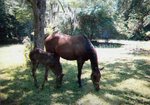After reading Steve Haskin's book about Dr. Fager, I sensed a special connection with him, an unnamed bond that I had not felt when I read about Man O' War or Secretariat. A kind, loving temperament in an animal is important to me, and the description of Dr. Fager's personality was of a sensitive, caring equine. He was smart, responded quickly to training, and was well-liked at Tartan, where he was born. During his breeding years, there was a cat that had a litter of kittens in the Doc's stall. He kept watch over those kittens, nuzzling them before heading off for his morning oats. It was said that when Mama Cat removed her children, the Doc was very upset.
After substantial Internet research, I discovered that Dr. Fager was buried on Tartan Farms' property. I learned that the current Winding Oaks had previously been Mockingbird Farm and, beginning in the 1960s through the 1980s, Tartan Farms. William McKnight, founder of the "Scotch Tape" giant 3-M Corporation, had purchased hundreds of acres west of Ocala and started his Thoroughbred dream. Thanks to the mating of Tartan Farms' foundation broodmare, Aspidistra, to the stallion Rough 'N Tumble, a bay colt was foaled on April 6, 1964, and given the name Dr. Fager. "The Doc" had started in twenty-two races, posting eighteen wins, two seconds and one third. Unlike many horses today, The Doc started eight times as a four-year-old.

After checking in with Mary at the Winding Oaks' front office, she offered to escort me up the rolling hills on Graeme Hill Road to the patch of land used to inter a number of well-known champions. As she pointed me towards the graves, I thanked her for her kindness and courtesy. I was alone.
All the graves were marked by gray medium-sized tombstones. Despite some of those stones being erected over thirty-five years ago, they were clean and legible. The graves were laid in a semi-circle around a freshly painted gazebo. A jade-green and well-kept hedge covered all the graves.
Feeling an urgency to locate Dr. Fager's resting place, I found him nearly in the middle of the fourteen-horse plot. I turned to gaze out across the nearly-too-green, rolling hills. The seemingly unlimited view from the hilltop was fantastic, an endless view a horse would relish in life. I could almost see the Doc at the crest of this hill, wind blowing his mane, tail whipping and flowing behind him. Surveying the valley below, his mind's eye would calculate how fast could he fly without wings through the lowlands, his equine instincts reverting to their untamed, glorious past, when his ancestors roamed free.
I read the plaque on his grave: "Racing's Grand Slam: 1968 - Horse of the Year, Handicap Champion, Sprint Champion, Grass Champion. World record of one mile, 1:32 1/5 in 1968." Many consider his earning those four major championships the greatest single season in racing history. The plaque doesn't say that his world record of 1:32 1/5 still holds today, and he carried weight of 134 pounds.
Gifted with lightning speed and indomitable spirit, Dr. Fager was weighted with 139 pounds, nearly unheard of today, for the seven furlong Vosburgh Handicap. His final time of 1:20 1/5 broke the previous track record by a full second, and was only one fifth off the world record, a feat still unequaled. Retiring with over one million dollars in earnings, he is still the only horse to ever win all four of these honors in one year. In 1999, Blood Horse Magazine racing experts selected the top one hundred thoroughbreds of the twentieth century; Dr. Fager was ranked number six. Tragically, he died at the age of twelve from what has variously been called a "colon obstruction", "ruptured stomach" or "torsion to the large colon."
Breathing deeply, I felt a lump in my throat as I paused at each horse's grave; Dr. Patches, 1978 Champion co-sprinter, Ta Wee, the 1969-70 sprint champion, and the 1980 Preakness winner, Codex. Let's not forget these great and not-so-great horses-it is through our memories that they live on in our hearts and souls. As the tears burned my eyes, I hoped they were at least loved by someone. Their grace, athleticism and beauty deserve to be cherished and respected. Their individual struggles and victories form a tiny part of thoroughbred history. Through love and remembrance, these heroes of yesterday can thus be honored.

No comments:
Post a Comment